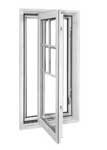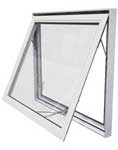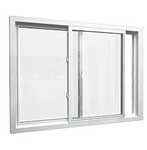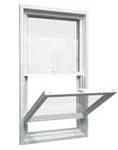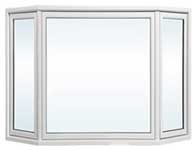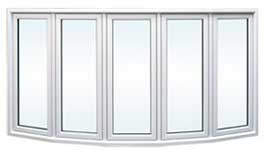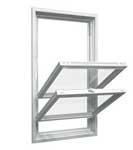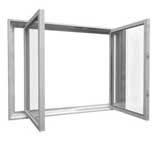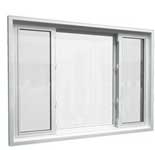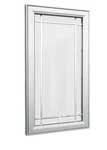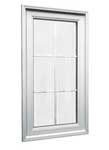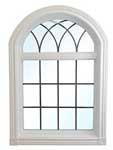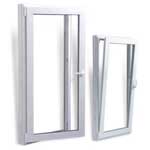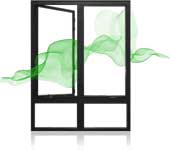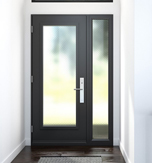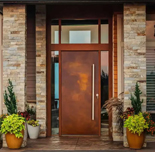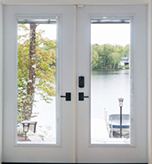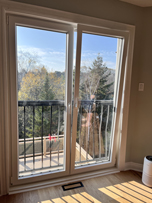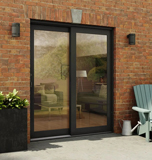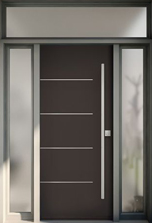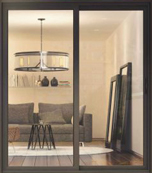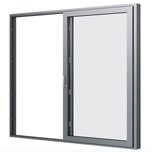When looking into new windows, one of the most significant choices you will face is choosing a suitable material. Whether you’re embarking on a home renovation journey or simply upgrading your windows through replacement, the choice between vinyl and aluminum can make a big difference, as they both have distinct benefits and drawbacks.
In this article, we will look at the similarities and differences between vinyl vs. aluminum windows and point out the 6 key differences to help you make an informed decision for your home.
What Are Vinyl Windows?
Vinyl windows are the silent workhorses of home design, offering a winning combination of durability, energy efficiency, and aesthetic appeal. Crafted from polyvinyl chloride (PVC), these windows boast a robust construction that stands up to the tests of time and weather. What sets vinyl windows apart is their exceptional insulation properties, making them a smart choice for homeowners looking to enhance energy efficiency and reduce utility costs.
The PVC material not only provides thermal resistance but also makes these windows resistant to moisture, ensuring they maintain their structural integrity even in humid or rainy climates. Beyond their functional attributes, vinyl windows are available in a diverse range of styles and colours, allowing homeowners to customize their windows to match the unique personality and design aesthetics of their homes.
The low-maintenance charm of vinyl windows further adds to their appeal. Unlike traditional wood frames that may require periodic painting or sealing, vinyl windows are virtually maintenance-free. They won’t warp, rot, or corrode, making them a hassle-free choice for those seeking a long-lasting and reliable window solution.
Whether you’re drawn to their energy-efficient features, customizable designs, or the promise of minimal upkeep, vinyl windows are a versatile and practical option for anyone looking to elevate the comfort and aesthetics of their home.

What Are Aluminum Windows?
Aluminum windows are sleek and contemporary, embodying a more modern approach to architectural design. Crafted from lightweight yet robust aluminum frames, these windows are favoured for their durability and minimalist aesthetic. The strength of aluminum gives these windows resilience against the elements, ensuring a long-lasting and reliable performance.
One of the standout features of aluminum windows is their slim frame design, allowing for expansive glass surfaces that let in plenty of natural light. This characteristic not only contributes to a bright and airy interior but also aligns perfectly with the clean lines and simplicity of modern architecture.
While aluminum windows may not possess the same insulation properties as some other materials, their stylish appearance and low-maintenance appeal make them a sought-after choice for contemporary homeowners. The sleek frames of aluminum windows offer a chic and sophisticated look, often associated with industrial-inspired design.
Resistant to corrosion and requiring minimal upkeep, aluminum windows provide a hassle-free solution for those who appreciate a modern aesthetic without compromising durability. Whether you’re looking to update the look of your home or seeking a practical and stylish window solution, aluminum windows make a compelling case for those who value both form and function in their living spaces.
Vinyl vs Aluminum Windows: The Major Differences
While both vinyl and aluminum windows have their benefits, let’s compare them to help you decide which of the two materials fits your requirements the best.
Appearance and Aesthetics
Vinyl windows often offer a classic and versatile aesthetic. They come in various styles and colours, allowing customization to suit different architectural designs. Aluminum windows, on the other hand, have a modern and minimalist look. Their slim frames contribute to a sleek and contemporary appearance, ideal for those who appreciate a clean, industrial-inspired aesthetic.
Energy Efficiency
Vinyl windows are known for their excellent insulation properties. The PVC material provides thermal resistance, contributing to energy efficiency by helping to maintain a consistent indoor temperature. Aluminum windows, while durable, are not as effective in insulation. Their conductivity can lead to more significant heat transfer, potentially making them less energy-efficient than vinyl in extreme climates.
Installation
Both vinyl and aluminum windows are relatively easy to install. However, vinyl windows are often lighter, making them potentially easier to handle during installation. Aluminum windows, while durable, can be heavier, requiring careful attention during the window installation process.
Insulation
Vinyl windows, with their PVC composition, provide superior insulation. This not only helps in regulating indoor temperatures but also contributes to reduced energy costs. Aluminum windows, due to their conductivity, may not offer the same level of insulation and may allow for more heat transfer.

Maintenance and Cleaning
Vinyl windows are virtually maintenance-free. They do not require painting, sealing, or special cleaning treatments. Regular cleaning with mild soap and water is usually sufficient. Aluminum windows may require occasional attention to prevent corrosion. Cleaning typically involves mild detergent and water but may need more care to avoid scratches on the aluminum surface.
Strength and Damage Probability
Aluminum windows are known for their strength and resilience, making them resistant to impacts and weather conditions. Vinyl windows may be more susceptible to damage in extreme conditions. However, they are less prone to denting or scratching compared to aluminum.
Conclusion
In conclusion, the choice between vinyl and aluminum windows hinges on considering various factors, each with advantages and trade-offs. Vinyl windows shine in energy efficiency and low maintenance, offering a classic and versatile aesthetic. Their excellent insulation properties make them a practical choice for those prioritizing energy savings and a timeless look.
On the other hand, aluminum windows present a modern and sleek appearance, with durability and strength as their standout features. While they may not match vinyl in insulation, their minimalist design and resistance to impacts make them an attractive option for those drawn to contemporary aesthetics.
The decision ultimately rests on personal preferences, budget considerations, and the specific needs of the home. Whether opting for the efficiency and classic charm of vinyl or the stylish resilience of aluminum, you can now make an informed choice, understanding the significant differences across appearance, energy efficiency, window installation, insulation, maintenance, and strength.
Each window type brings its unique character to a home, and by weighing these factors, you can embark on a window upgrade journey tailored to both practicality and style.
Make Eco Choice Your Top Choice for Windows & Doors
Eco Choice Windows & Doors is a leading supplier and installer of quality windows and doors. We have been in business for over 15 years, installing windows and doors for many satisfied customers across the province.
We have the knowledge, experience and expertise to recommend the windows and doors that best suit your needs. Simply put, we supply the best quality products, expertly installed and built to enhance energy efficiency throughout the home.
Call us today at (416) 690-9992 or complete our convenient online form to book your free, no-obligation consultation to find the right windows for your home!
FAQs About Vinyl and Aluminum Windows
The main distinction lies in the material composition. Vinyl windows are made from polyvinyl chloride (PVC), offering excellent insulation and low maintenance. Aluminum windows feature frames made from lightweight aluminum, providing a sleek and modern aesthetic.
Generally, yes. Vinyl windows are known for their superior insulation properties due to the PVC material, contributing to better energy efficiency than aluminum windows.
Aluminum windows are often considered more durable and resistant to impacts and weather conditions. However, vinyl windows are also durable and resistant to rotting and corrosion.
Vinyl windows are virtually maintenance-free, as PVC does not warp, rot, or corrode. Aluminum windows, while durable, may require occasional attention to prevent corrosion.
It depends on personal preference and the desired architectural style. Vinyl windows provide a classic and versatile look, while aluminum windows have a modern and minimalist aesthetic.

